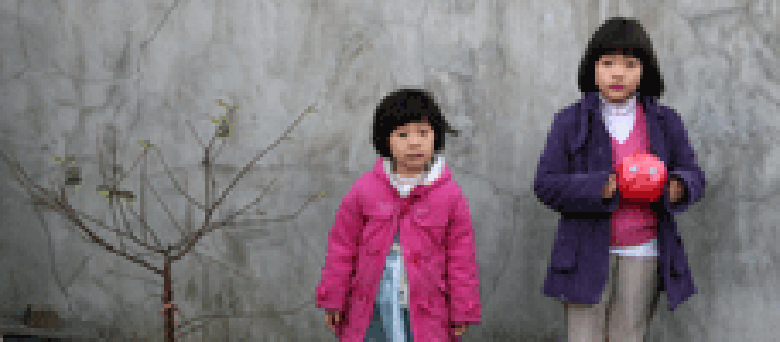Reviews
So Yong Kim
USA / South Korea, 2008
Credits
Review by Leo Goldsmith
Posted on 28 April 2009
Source 35mm print
Categories New Directors/New Films ’09
“Have your mother teach you how time works.” This is the first thing we hear in So Yong Kim’s wistful Treeless Mountain: an assignment a teacher gives her young students before they go home. Six-year-old Jin is among these students, and one who may need this lesson in time more than others. On her way home from school, she’s distracted by friends and games and other concerns of a girl her age, and she’s late to pick up her younger sister Bin, who is being watched by a neighbor while their mother is at work. When she gets home, her mother scolds her, but gently, sympathetic (and a little ashamed) of the amount of responsibility she has placed on her young daughter.
This is the painful necessity of a single parent with few other options, conveyed offhandedly but masterfully in the film’s first sequence. Here and throughout the film, Kim employs a style of implication that owes a great deal to the work of Hou Hsiao-hsien (especially his early work; A Summer at Grandpa’s is an obvious model), and as with many of the Taiwanese director’s films, there is the sense in Treeless Mountain that life is simply drifting inexorably by. It takes nearly the entire duration of the film for the viewer to infer any moral from its story, which follows the journey of the young girls, Jin and Bin, as they are passed from loving care of their mother (who becomes unable to support them) to the less cozy home of their aunt in the suburbs, and finally to their grandparents in the country.
All the while, the notions of time and duration gain in metaphysical weight, especially for the two girls, who wait expectantly for their mother’s return. Playing amongst the treeless rubble-piles behind their aunt’s house, grilling and selling grasshoppers that they catch nearby, and not attending school, Jin and Bin live in a kind of holding pattern, a temporal and spatial interstice where they must navigate their aunt’s alcoholism, bitterness, and capricious temper. They befriend a neighborhood child with Down Syndrome, whose mother is more friendly and generous than their aunt, and stow the money they earn from their grasshopper business in a plastic piggy-bank, agreeing and believing that their mother will return when the piggy is full.
Treeless Mountain, which seems to have been filmed in late autumn, is shot through with the pale beauty of grey skies and yellow reeds. Anne Misawa’s extremely restrained long-takes and tight compositions, usually with a lot of foreground action, captures watery and meek colors, which are often contrasted with astonishing natural highlights, even in the suburbs. The sound design enhances these natural textures as well, and the film remains largely scoreless but for some lovely intro and outro music from the band Asobi Seksu (whose name, it must be noted, means “sport fuck” in Japanese).
The sobriety and temperance which guides every aspect of Kim’s film, along with its story of abandoned children, their diminutive mythologies, and feral fantasies, aligns Treeless Mountain with a cycle of films from East Asia that seek to take childhood seriously, far more seriously than it is usually taken in Western cinema. Among these films are a number of works by Yasujiro Ozu and Hou, but also films like Hayao Miyazaki’s My Neighbor Totoro and, more recently, Hirokazu Kore-eda’s Nobody Knows. And with its depiction of the soft banality of Anytown, South Korea, Kim’s film also seems a not-so-distant cousin to Lee Chang-dong’s Secret Sunshine. (In fact, Lee helped somewhat in the production of Treeless Mountain, recommending the two actors who play the children’s mother and aunt for their roles.) This view of the film in terms of national cinemas may seem superficial, even a little crude, but it seems an inevitable point to make about a film by determinedly international filmmakers: Kim, who was born in South Korea and raised in California, and her husband and filmmaking partner, Bradley Rust Gray, whose last film as director, Salt, took place entirely in Iceland. (Treeless Mountain’s New York theatrical run coincides with the screening of Gray’s new film The Exploding Girl, which Kim also produced, at the Tribeca Film Festival.)
But if anything, this suggests that Treeless Mountain is not just a self-consciously “Asian” film, but that it also fits quite well into the context of contemporary American independent cinema. Like Kelly Reichardt’s Wendy and Lucy, the film exercises a kind of realism that’s not in the service of moralism, opting to address issues of social concern through its characters’ moods and affect rather than their politics or psychology. Like Reichardt, Kim finds an inherent constraint in “mere” vérité filmmaking, and thus seeks to not to provide an objective view of children, but an enveloping, but plausible recreation of a child’s perspective—fascinated by minutiae, sensitive to pain, and unaware of the workings of time.
Treeless Mountain will also screen at New York City’s Film Forum through Tuesday, May 5th.
More New Directors/New Films ’09
We don’t do comments anymore, but you may contact us here or find us on Twitter or Facebook.





